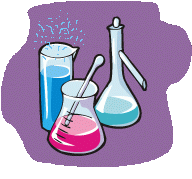


Description of experiment
Below follows a plain text transcript of the selected experiment.
![]()
Needed compounds:
-----------------
sodium chlorate : NaClO3
sulphuric acid : H2SO4
potassium bromide : KBr
Class:
------
elem=Br,Cl
redox
Summary:
--------
It is possible to make an aqueous solution of bromine, which is so saturated,
that the bromine separates from the liquid. In order to do so, a chemical
reaction, producing large quantities of bromine must be performed.
Description:
------------
Dissolve as much KBr in a given volume of water as possible and slowly add
concentrated sulfuric acid to the liquid: A lot of heat is produced (hydration
of sulfuric acid), the liquid becomes orange. Apparently some of the bromide
is oxidized by the concentrated sulfuric acid. After some time large crystals
of KHSO4 (or K2SO4?) appear in the liquid.
Wait till liquid cools down and decant the liquid from the crystalline mass
at the bottom. Add solid NaClO3 to the liquid: The solid quickly dissolves.
Slow formation of bromine. The intensity of the orange color slowly increases.
At a certain moment, the liquid becomes turbid and a brown precipitate appears.
It looks as if finely suspended rust is floating in the liquid. These rust-like
particles are droplets of bromine. Above the liquid a thick vapor of bromine
appears. On the glass little drops of bromine are formed.
Open the bottle and pour the thick red/brown vapour on a cool surface: Little
drops of bromine are formed on the surface. When the bottle is taken away,
the drops of bromine produce thick red vapours and slowly evaporate.
Pour the liquid from the bottle on a flat surface: An area is covered with
aqueous liquid and at the borders of the aqueous liquid an edge of dark
concentrated liquid bromine can be observed. The edges produce large amounts
of vapour. After some time, all bromine has evaporated and a yellow aqueous
liquid remains.
![]()